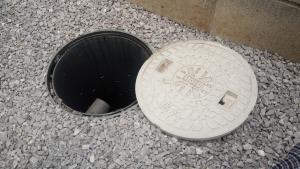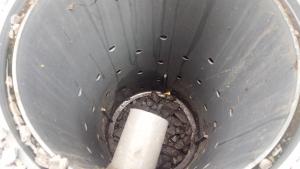Last updated: August 24, 2017
Inagi City is currently developing rainwater storage and infiltration facilities to process rainwater that falls within the city.
This rainwater storage and infiltration facility can be installed on your property.
By installing rainwater storage and infiltration facilities, the amount of rainwater flowing into the city's waterways and rivers will be reduced, preventing flooding.
We ask for your cooperation in installing and maintaining these flood protection devices to protect your homes and towns from flooding caused by frequent localized heavy rains.
An example of rainwater infiltration is a rainwater infiltration trench.
By allowing rainwater to permeate underground, it becomes groundwater and can be effectively utilized as a healthy water circulation resource.
Rain that falls on the roof is channeled through rain gutters into rainwater infiltration basins.
One rainwater infiltration basin with a diameter of 25 centimeters has the ability to infiltrate the ground into the ground, equivalent to the amount of rainwater equivalent to one full bath per hour.
Rainwater infiltrates allow rainwater to infiltrate through the holes on the bottom and sides, as shown in the photo below. Please clean regularly to prevent the infiltration function from decreasing due to dirt and fallen leaves.

Rainwater will seep in (with the lid removed)

Rainwater permeates (inside)
In addition to rainwater infiltration basins, you can obtain even more infiltration effects by installing infiltration trenches.
Although it cannot be seen visually on a daily basis, it can be installed on the premises as shown in the photo below. Rainwater infiltrates through perforated pipes and gravel at the bottom.
Infiltration trench under construction
A storage tank is an example of rainwater storage. By installing a storage tank, rain that falls on the roof can be temporarily stored and used for watering home gardens, trees, and as valuable water for daily use in times of disaster.
In addition, in the event of heavy rain, it is possible to prevent the concentration of wastewater by staggering the storage time.
Proper maintenance and management of rainwater storage and infiltration facilities will allow them to continue to demonstrate their full potential.
Please regularly clean the rainwater infiltration tank and the sand and fallen leaves that have accumulated in the storage tank.
Additionally, because rainwater storage and infiltration facilities are buried underground, they are not seen on a regular basis, so their location, scale, and maintenance may not be fully confirmed.
Please check your home's rainwater storage and infiltration facilities and perform regular maintenance.
The Tokyo Metropolitan Government has designated June as the month for strengthening stormwater countermeasures, and asks everyone to prepare for flooding.
If garbage or other items are placed in storm drains or gutters installed on residential land or along the roadside, rainwater will not flow into them, increasing the risk of flooding.
Please clean the areas around your storm drains and gutters regularly to ensure that rainwater flows smoothly.
Tokyo Metropolitan Bureau of Sewerage/External link
http://www.gesui.metro.tokyo.jp/
The Tokyo Metropolitan Bureau of Sewerage has posted ``Tokyo Amesh'' on the Internet, which provides real-time updates on rainfall information.
When heavy rain is predicted, be prepared by checking the news and information such as "Tokyo Amesh."
Tokyo Amesh (external link)
http://tokyo-ame.jwa.or.jp/
Inagi City Urban Environment Development Department Sewerage Division Phone: 042-378-2111